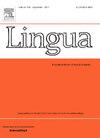‘What the X’ in Anglophone government meetings: Areal distribution, emotionality, and euphemism
IF 1.1
3区 文学
0 LANGUAGE & LINGUISTICS
引用次数: 0
Abstract
This article examines the use of potentially offensive expressions, specifically “what the hell” and its euphemistic variants, in local government meetings across English-speaking countries. Two primary research questions are addressed: first, are there noticeable differences in the frequency of these expressions between countries and within regions? And second, how do euphemistic alternatives compare to “what the hell” in terms of emotional intensity and valence, both across and within national varieties? The study draws on data from three large, recent corpora of geolocated automatic speech recognition (ASR) transcripts and the corresponding underlying audio to explore the geographic distribution and emotional nuances of these expressions in various English-speaking countries, including the US, Canada, the UK, Ireland, Australia, and New Zealand. To assess the emotionality of expressions, specifically anger, the speech emotion recognition model emotion2vec is employed. The findings provide insight into how the acceptability and emotional weight of “what the hell” and variants differ across regions. Additionally, the study demonstrates the potential of vector-based representations of speech in multimodal corpus analysis, while empirically validating theoretical claims in semantics related to pejoration and euphemism.
求助全文
约1分钟内获得全文
求助全文
来源期刊

Lingua
Multiple-
CiteScore
2.50
自引率
9.10%
发文量
93
审稿时长
24 weeks
期刊介绍:
Lingua publishes papers of any length, if justified, as well as review articles surveying developments in the various fields of linguistics, and occasional discussions. A considerable number of pages in each issue are devoted to critical book reviews. Lingua also publishes Lingua Franca articles consisting of provocative exchanges expressing strong opinions on central topics in linguistics; The Decade In articles which are educational articles offering the nonspecialist linguist an overview of a given area of study; and Taking up the Gauntlet special issues composed of a set number of papers examining one set of data and exploring whose theory offers the most insight with a minimal set of assumptions and a maximum of arguments.
 求助内容:
求助内容: 应助结果提醒方式:
应助结果提醒方式:


